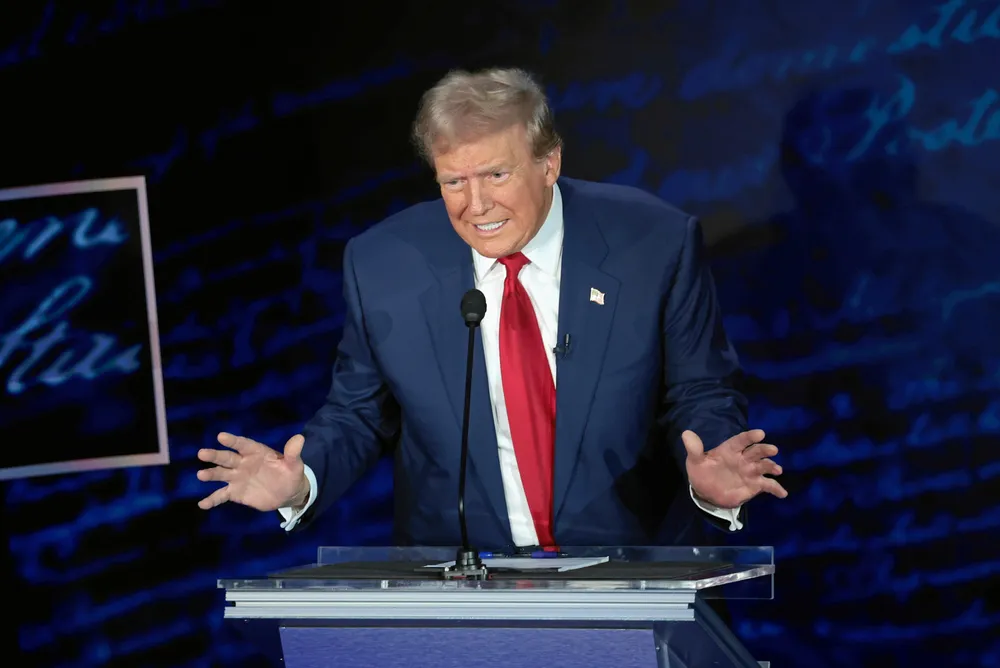'Greetings from Germany, President Trump: our green energy shift is alive and well'
OPINION | Europe's largest economy despite some bumps in road is steadily advancing its 'Energiewende' and the evidence backs it up, Bernd Radowitz writes from Berlin

Republican candidate and former President Donald Trump in his debate with vice president Kamala Harris last night wrongly claimed that Germany has given up on its Energiewende – its transition from nuclear and fossil to renewable power – and has supposedly reverted to only building fossil power plants again.
Trump told Harris: “You believe in things like we're not going to frack. We're not going to take fossil fuel... Germany tried that and within one year they were back to building normal energy plants.”
As usual with Trump, it takes some patience to interpret his incoherent line of argument, but what most US viewers and potential voters likely understood from this statement is that Germany tried to ditch fossil fuels, but within a year had to give that up. The assumption here is also that Trump by “normal energy plants” meant fossil-fired generation.
The fact is that Germany is more advanced in its energy transition than any other large economy, even if there have been some bumps in the road, particularly in the past two years when Trump’s friend Vladimir Putin throttled gas supplies to Europe and (temporarily) managed to send energy prices sky-high. This led to Germany briefly leaving some coal-powered power plants on the grid that had been scheduled for switch-off.
Within renewables, onshore wind led in the first half, providing 24% of Germany’s electricity needs (up from 22% a year earlier), while offshore wind made up 5% (from 4%). PV accounted for 14% of German power needs (up from 13%), while biomass met 9% (up from 8%) and hydropower 5% (up from 4%).
"During the extraordinary crisis in 2022, we temporarily reactivated coal-fired power plants - as a double safety net - but did not build any new ones. All of these temporarily reactivated coal-fired power plants have left the market again."
In the US, renewables account for less than half of the German share of power consumption, although their contribution has also been rising.
Germany in the wake of a new power plant strategy is also planning to tender off 12.5GW of mostly 'hydrogen-ready' power plant capacity, which in part would only be switched on for days of scarce renewables on the grid.
“In this way, we are making the electricity system fit for high proportions of renewable energies and are also securing ourselves for times when there is little wind and sun,” German economics and climate minister Robert Habeck said today when presenting the strategy.
The ministry spokesman added: "We are now planning to build new power plants. These are not "normal" fossil power plants, however, but power plants that initially run on natural gas, but are prepared for later use with hydrogen and will in the future run on hydrogen and thus be fossil-free."
It is unclear – but unlikely – that Trump was referring to those planned power plants when mentioned the “normal energy plants” Germany has supposedly reverted to. The former President is not famous for his grasp of the finer details of European energy policy.
In any case, the intention (and after eight years of operation the obligation) to run the new plants on green or blue hydrogen makes clear the country wants to end the use of fossil fuels and become climate-neutral by 2045 at the latest as targeted.
The truth is that Germany is advancing its renewable energy expansion, while gradually phasing out fossil fuels. In solar, additions have actually exceeded the government’s target of 9GW last year – nearly 15GW were installed instead. Another 7.6GW was added during the first half of this year.
In onshore wind, expansion targets have been missed in recent years, and net additions during the first half of 2024 were less than 1GW. But wind groups have pointed out that government measures to boost the onshore wind expansion were showing first significant signs of success, with new permits soaring by 32% during the first half of the year, and tenders meeting more investor interest.
The country is also preparing legislation to boost the use of geothermal energy.
Germany’s Energiewende had some bumps in the road, but is advancing faster than ever, despite Trump’s ill-informed doom-mongering.
(Copyright)